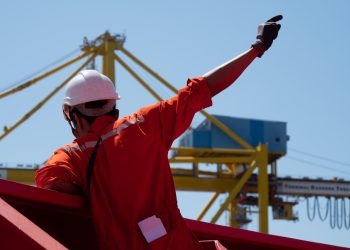Andreas Chrysostomou, CEO, Marine Fields explains how shipping may effectively use data, which is rightly characterized as the ‘Gold of the digital age’ and refers to his company data sharing platform, Perseus, that aims to enhance the predictability of port call operations. Concluding, Mr. Chrysostomou calls industry to follow the evolution timely, stressing that we are to witness more digital developments in future and that there is need to build a ‘shipping digital culture’ to embrace transparency, collaboration and efficiency.
SAFETY4SEA: What are currently the biggest smart shipping challenges from your perspective? What is your organization’s response?
Andreas Chrysostomou: The biggest challenges smart shipping has today is the availability of necessary data layer to allow for big data analysis to enable optimization and execute on the necessary activity to make smart shipping a reality.
Without the data layer situational awareness, paramount for smart shipping, is simply not possible. For a good reason data is being called the “Gold of the digital age”.
Enough data exists today, but following reasons are preventing smart navigation to take off as the data sources are not accessible:
- Lack of digitalization
- Lack of digitization
- Missing infrastructure for data sharing
- Missing of the necessary granularity on data protection during data sharing process.
MarineFields services is built to address exactly challenges 3 and 4. It is a non-proprietary solution to solve these issues which in my opinion prevent smart shipping to really kick off.
S4S: Tell us a few words about Perseus, your company’s Maritime Data Sharing Platform. What are the benefits for the organizations? How happy are you with its market acceptance so far?
A.Chr.: MarineFields, data sharing platform Perseus, enables actors to share time stamps and common situational awareness among each other associated to port call operations. It aims at providing capabilities for sharing time stamps, in the standardized format S-211, between port actors within ports, between ports, between ships and ports, and between ports and hinterland operators with the purpose of enhancing the predictability of port call operations.
[smlsubform prepend=”GET THE SAFETY4SEA IN YOUR INBOX!” showname=false emailtxt=”” emailholder=”Enter your email address” showsubmit=true submittxt=”Submit” jsthanks=false thankyou=”Thank you for subscribing to our mailing list”]
The main benefits from Perseus is its neutrality as a data sharing platform which allows actors associated to port call operations to share data that transcends the boundaries of company structures, alliances, and ownership.
It is still early to talk about market acceptance as there still quite few unknown factors for the industry to accept some of the offered tools and solutions especially data sharing platforms.
S4S: What does ‘Internet of Maritime’ mean in real life? Is the industry ready for this concept?
A.Chr.: The “Internet of Maritime” (IoM) is a term we attribute to the maritime domain that has the necessary flexibility and scalability of many-to-many connectivity within a secure infrastructure and mitigates Cyber Risks.
Yes, the industry is ready for such because the concept of peer-to-peer data exchange, between key partners with dedicated communication lines lucks the needed scalability and flexibility to keep up with the demand. The IoM on the other hand solves this problem which is already a well and documented issue from the time before Internet.
S4S: Which are the key drivers and barriers towards data sharing?
A.Chr.: The key driver towards data sharing in my opinion is enhanced predictability which enables actors to share with each other what they know about events that are planned for and has happened associated to core port call operations.
The major barrier on the other hand is the willingness to share data in an open environment for many obvious reasons, that is very important that Data sharing platforms provide ‘ring fencing’ of data to those that have been approved to receive the data.
S4S: How is cyber safety and security ensured in data sharing? What are the top 3 priorities of Perseus towards that end?
A.Chr.: Safety and Security are intrinsic assets of Perseus. It uses various methods to ensure the data sharing through the systems is fully trustworthy and addresses the challenges 3 and 4 as raised in the first question. Top priorities addressed by Perseus are:
- Identity registry and validation this ensures that each actor is validated, and the sharing community is ensured that the actors are clearly identified and not compromised.
- Service discovery Perseus enables access of the right services data should be shared with. This provides the necessary confidence that data is shared with the right services, in need for the data without cumbersome activities to identify how and when to reach the target audience.
- Data privacy protection to ensure only the intended target audience, defined by the data owner, get access to the data and data leaks are prevented.
S4S: Do you think the entire shipping industry will be completely digitalized and if yes, when will that happen? What does a digital culture look like in shipping?
A.Chr.: Yes! I do believe that because it is the only way forward. The digital world is not a trend or fab is how things evolved to be. I am sure in the future will other forms of evolution, but a completely digitalized world is what is happening today.
Digital technologies influence the links between objects, space and time and as such a shipping digital culture for shipping is the one that provides transparency, collaboration and efficiency. The latter been the central objective due to public pressure in relation to warming of the planet.
S4S: What sort of developments and improvements can we look forward to in terms of smart shipping up to 2030?
A.Chr.: I would say here that we will see more and more use of AI, Augmented reality and virtual reality especially in the fields of ship design and construction but also in the optimization of the logistics chain. Block chaining will gain momentum and d be used if not always but, in many cases,, especially on the field if transboundary transactions and I will not be surprised if the autonomous ship will be more common than scarce.
S4S: How can the shipping industry lead the technological change? What is your advice for those maritime businesses who are looking to digitize but haven’t started yet?
A.Chr.: The answer here is simple, not one size fits all. The ones that need to digitize as a matter of priority we have already saw them doing it. Those that have not started yet are those that have not seen the need to do so. In the chain of events though all will have, eventually to follow the digital path as will be impossible otherwise to be interconnected and stay in business.
S4S: In comparison to other sectors, do you believe the maritime industry is behind others in the adoption of digital transformation? What is the biggest obstacle toward that end and your suggestions to move forward?
A.Chr.: Many will agree that the industry is not as advance as other industries in the adoption of the digital transformation, but the shipping industry does not always need to be on the forefront of this evolution, but nearly every actor within is working towards the digital transformation.
I think the obstacles are well defined in first question; that is why we in MarineFields are trying to help overcome these challenges by enabling a way forward while keeping the good aspects of the maritime ecosystem: dedication, careful consideration and acting in confidence with trusted partners.
S4S: What is your key message to industry stakeholder as we are accelerating our speed toward smart era?
A.Chr.: Make sure that you follow the evolution timely, don’t let competition outsmart you.
The views presented hereabove are only those of the author and not necessarily those of SAFETY4SEA and are for information sharing and discussion purposes only.
 Andreas Chrysostomou is the CEO of Marine Fields, as well as the CSO of Tototheo Maritime. He has studied Naval Architecture and Shipbuilding at the University of Newcastle upon Tyne, while he has extensive experience as Head of Policy, multilateral affairs and standards, at the Department of Merchant shipping at Government of Cyprus.
Andreas Chrysostomou is the CEO of Marine Fields, as well as the CSO of Tototheo Maritime. He has studied Naval Architecture and Shipbuilding at the University of Newcastle upon Tyne, while he has extensive experience as Head of Policy, multilateral affairs and standards, at the Department of Merchant shipping at Government of Cyprus.






























































